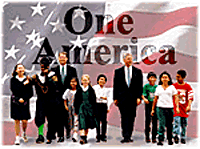 |
 |
In 1991, two young people, Vanessa Kirsch and Katrina Browne, became frustrated with the media's continued portrayal of their generation as "slackers." Their research confirmed that young people were concerned about their communities, but did not know how to become involved. They also learned that nonprofit agencies were not good at recruiting young people, especially minorities, and their retention record for keeping young people in these jobs was lacking. Public Allies was created to identify young people who wanted to become involved in their local communities and create opportunities for them to explore careers in nonprofit organizations.
Public Allies recruits a multiracial group of young adults, ages 18-30, to serve in full-time professional apprenticeships over a 10-month period in nonprofit agencies. Participants ("Allies") have worked in a variety of places including youth development organizations, health care settings and community development corporations. They gather once a week for a workshop on leadership training, and they also participate in a Team Service Project, an activity where they examine the barriers that differences such as ethnicity, gender and race can present and learn how to utilize them as assets in strengthening communities. Upon graduation, the Allies either secure permanent employment or go to school. Public Allies is currently in seven cities across the country, including Washington, D.C., Raleigh, Durham, Wilmington, Milwaukee, Chicago, and San Jose.
Outcomes and Significant Accomplishments The direct beneficiaries of the program are the Allies themselves, the organizations where Allies work, and the recipients of these services, including 20,000 youth and families Over 400 young adults, the majority of whom are people of color, have graduated from the program, a 90% success rate. A recent independent survey of program graduates, performed by the Institute for Higher Education Policy, found that 64% of those currently employed are working for nonprofit organizations, while 19% work in the private sector, and 8% in government. Graduates said that the skills they have found most valuable are: their ability to work with people of different races; team-building skills; communication skills; and the ability to adjust to different work environments. The majority of the graduates have remained significantly involved in community-service projects.
|
![]()
To comment on this service,
send feedback to the Web Development Team.
![[White House icon]](/New/images/home_pin.gif)
![[Help Desk icon]](/New/images/help_pin.gif)